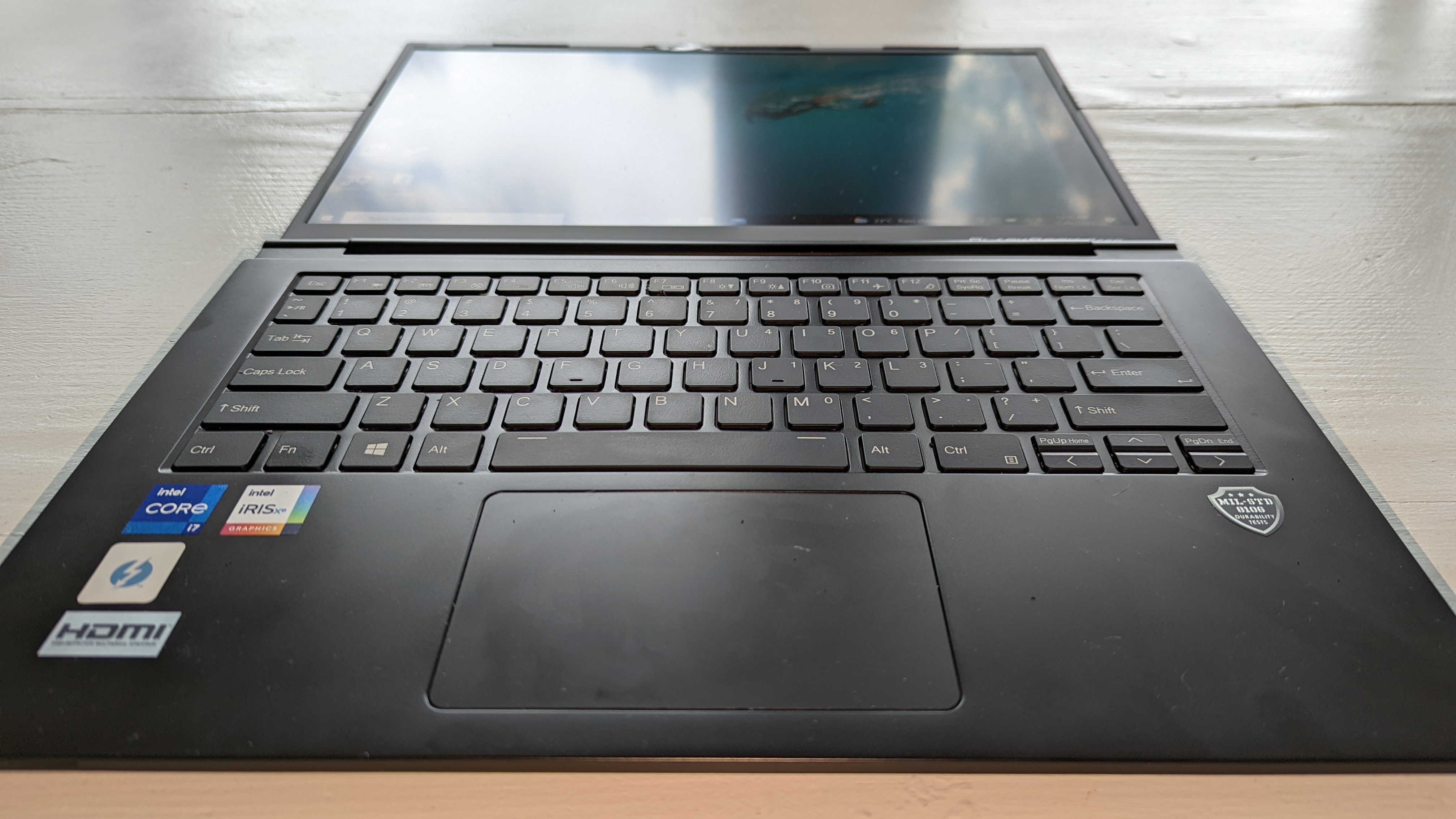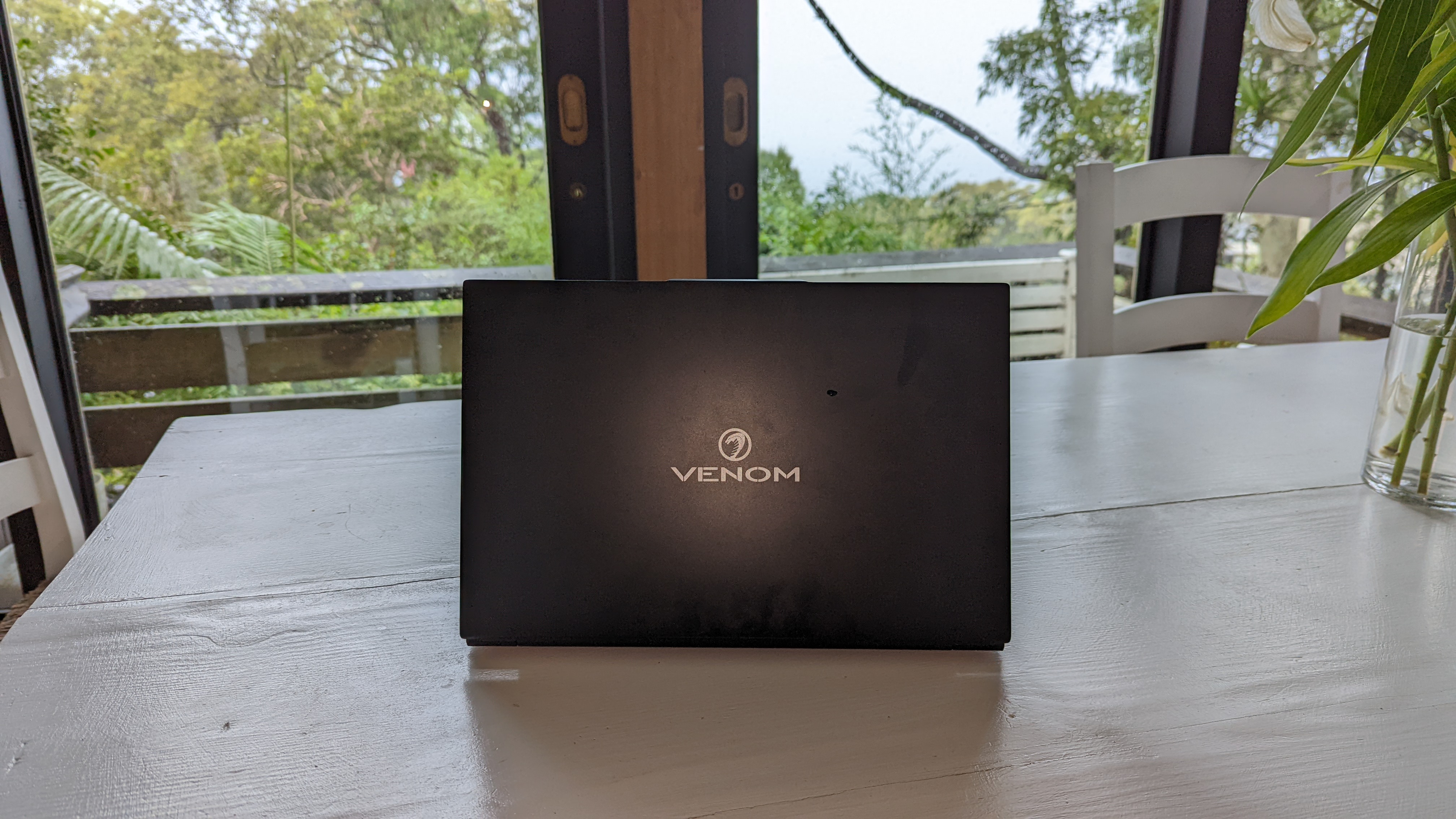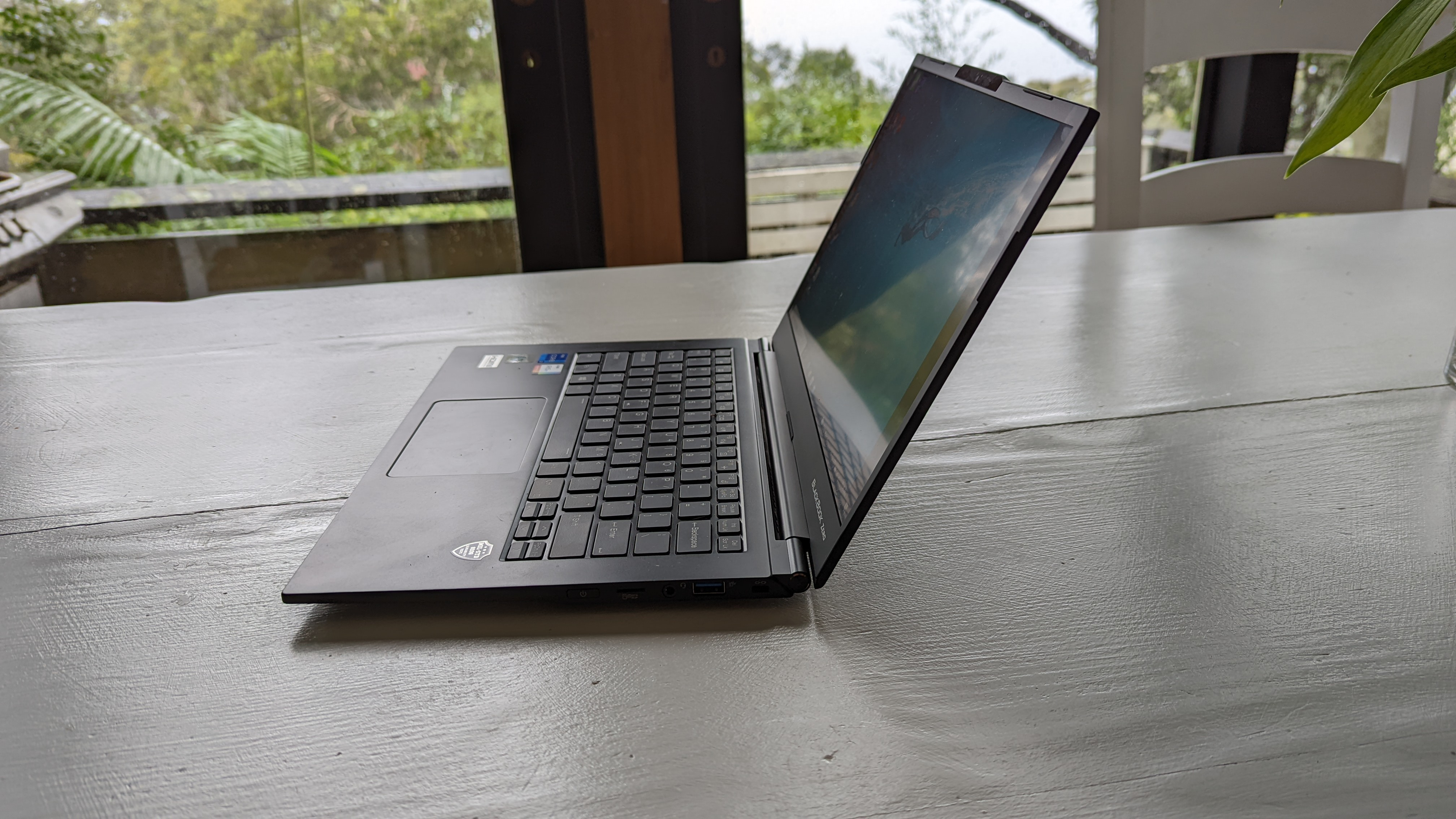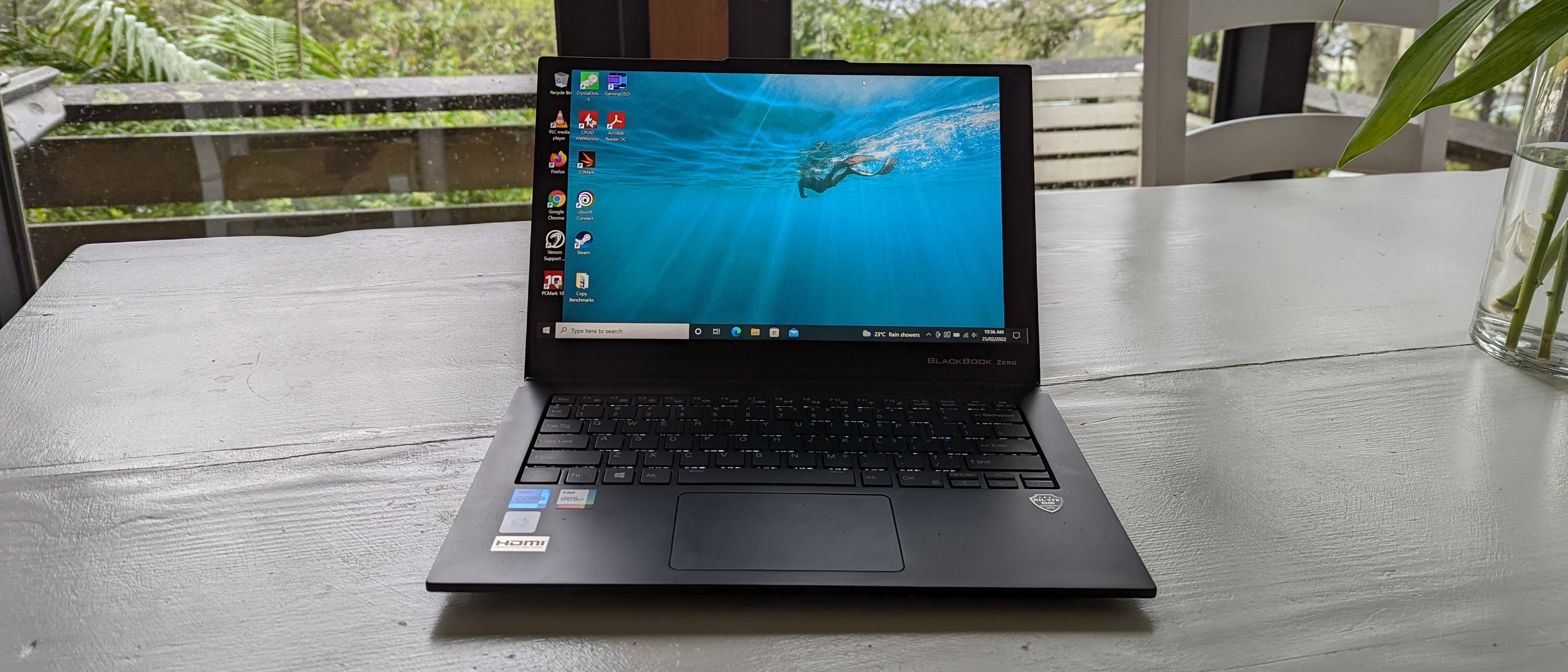TechRadar Verdict
The Venom BlackBook Zero 14 Phantom only has a 1080p screen and is a little late to be offering an 11th generation Intel processor, but it's very compact, has great battery life and comes with multiple chargers. So it'll appeal to business users that are always on the move.
Pros
- +
12.5h+ battery life
- +
Very lightweight
- +
2x chargers
Cons
- -
11th Gen Intel processors
- -
Premium price
Why you can trust TechRadar
There aren’t many laptop manufacturers you could call ‘independent’ operations, and of those a huge proportion are going to be localised rebranding operations of overseas cleanskin laptop manufacturers like Clevo. So what Venom computers do – i.e build laptops from the ground up to compete with global giants like Apple or Microsoft – is rather unique.
Building a laptop is no small task, it requires an in-depth understanding of current PC components and a considerable budget and funding allocation to get things off the ground, but no matter how hard it is for small businesses to get a foot in this market, consumers are mainly interested in getting the best product for their money.
Venom BlackBook Zero 14 Phantom price and availability
Here is the Venom BlackBook Zero 14 Phantom configuration sent to TechRadar for review:
CPU: 2.8GHz Intel Core i7-1165G7 (4 cores, 8 threads, up to 4.7GHz Turbo)
Graphics: Intel Iris Xe Graphics
RAM: 16GB
Screen: 14-inch 1080p IPS
Storage: 2 X 512GB Samsung PCIe SSD
Ports: 1 x USB-C with Thunderbolt 4, 2 x USB 3.2 (Type-A), 1 x HDMI, DC-in, audio combo jack
Connectivity Intel Dual Band Wi-Fi 6 AX201, Bluetooth 5.2
Camera: Webcam
Weight: 2.2 pounds (1 kg)
Size: 12.63 x 8.58 x 0.63 inches (321 x 218 x 16mm; W x D x H)
With a starting price of $1,199 (£899, AU$1,999) for an 11th-gen Intel i5, 8GB of RAM and a 250GB SSD configuration, the 2022 BlackBook Zero 14 Phantom is, at least, reasonably priced… especially if you’re an existing customer with an old Venom BlackBook that you can trade-in for a $400 (AU$500) credit.
This entry unit is still some way off the value offered by the more-powerful $999 (£999, AU$1,499) starting configuration of the Apple MacBook Air, but seeing as no other Windows based system came close to competing with the 2020 M1 Air, that’s not exactly a criticism of Venom.
The BlackBook Zero 14 Phantom comes in a handful of configurations so you can upgrade the CPU to an 11th Gen i7, double the RAM allocation to 16GB and swap to a 1TB SSD for $1,699 (£1,249, AU$2,699). If you have a unique need set you can increase the SSD or the RAM allocations further from here, but for most a 1TB SSD will be more than enough for a work laptop.
This is a reasonable RRP for an i7 with 16GB of RAM, roughly lining up with the cost of a Microsoft Surface Laptop 4 13.5-inch when you factor in the bigger SSD, but there are a couple of caveats that are worth pointing out.
The first is that devices like Dell’s virtually identical late 2020 XPS 13 were out for more than a year before the BlackBook Zero 14 Phantom launched and there’s some decent discounts to be had on these devices now that Intel’s 12th Generation mobile processors are just round the corner.
Sign up to the TechRadar Pro newsletter to get all the top news, opinion, features and guidance your business needs to succeed!
The other difference is that virtually all of the competition has a slightly higher resolution and more colour accurate screen, which makes the BlackBook Zero 14 Phantom a hard sell for anyone intending to use their laptop for visually creative work.

Design
The BlackBook Zero 14 Phantom might buck the trend by not going after creative professionals, but it does have a clear and sensible design ethos. The spec sheet suggests that it weighs up to 1.4kg, but the BlackBook Zero 14 Phantom we tested was actually only a touch over 1kg. This means it’s still up there with the best lightweight professional Ultrabooks we’ve tested, but it’s not quite leading the way.
The other standout features include two power supplies so you can leave one plugged in behind the desk at home or the office and leave the other in a travel bag or briefcase to get you out the door quicker. Then, for anyone who needs to reset the device from time to time, the unit comes with a handy USB recovery drive that makes it way easier to start again.
From here the spec sheet starts to look a little more predictable with a very stock 14-inch FullHD IPS display with an sRGB colour gamut. 16:9 is still a really common form factor in all sizes, but Apple, Microsoft, Dell, Lenovo and MSI have all swapped to 4:3, 3:2 or 16:10 aspect ratios on at least their smaller form factor devices.
This is because 16:9 is a cinematic format and while it works for media playback, your average web page or document is roughly A4 sized and takes up about three quarters of the width of a screen like the one on the BlackBook Zero 14 Phantom. While it’s not a deal breaker, today's best laptops convert that awkward width to vertical space that allows you to see more of the web page or document you’re working on.
The BlackBook Zero 14 Phantom does sometimes range with slightly more SSD storage than other similar units, which makes it a point of difference if you particularly like storage, but you’ll still pay for it. The device we tested came with two Gen 4 PCIe SSDs that could read and write at 3500MB’s on the main drive and up to 6900/5000MB/s on the second SSD according to internal tests. It’s as fast as single drives get on 2021 laptops and you don’t see many secondary PCIe SSDs on ultraportable laptops, so it’s a valid point of difference for anyone needing to store and move large files regularly.
The keyboard and trackpad were nice enough this time around, ditching some of the idiosyncratic layout decisions of the last iteration. Both felt comfortable over long sessions and offered everything you’d need for a work device. While the BlackBook Zero 14 Phantom didn’t offer a fingerprint sensor, it does come with Windows Hello Facial Recognition, but we suspect some business customers will be disappointed.
The interface options were extensive against today’s USB-C only alternatives including a HDMI port, a microSD card reader, and a couple of USB Type-A ports, alongside the more common USB-C and 3.5mm audio jack ports. While the HDMI port isn’t as essential as it was a few years ago, it’s still a nice safety net to be able to plug into pretty much any display and get basic plug and play compatibility.
The active cooling system is quiet, even when running full tilt and the heat that does radiate through the magnesium alloy chassis is confined to the space above the keyboard, well away from your palms.

Performance
Here's how the Venom BlackBook Zero 14 Phantom performed in our suite of benchmark tests:
3DMark: Time Spy: 1439
Cinebench R23 Multi-core: 4081 points
GeekBench 5: 1549 (single-core); 4817 (multi-core)
PCMark 10 (Overall): 5063 points
PCMark 10 Battery life: 12 hours and 6 minutes
Battery life (Techradar movie test): 14 hours and 29 minutes
Sid Meier's: Civilization VI (1080p, Low): 22 fps
It’s been about 5 years since we looked at the last Venom BlackBook Zero 14, so the device we tested was over 4 times faster than the previous model. The BlackBook Zero 14 Phantom we were sent to test, performed within about 5 percent of our recorded average on a number of general work tasks for similar devices with Intel i7-1165G7 CPUs.
It also showed a performance bump of up to 12 percent when in the Venom calibrated Performance power mode. It did however underperform in a number of GPU specific tests, lagging between 9 and 25 percent behind what we’d usually expect on an Intel Iris Xe Graphics processor, even when in Performance mode.
While the GPU performance was underwhelming, the BlackBook Zero 14 Phantom’s battery life is actually excellent. In general work benchmarks the 14-inch Ultrabook gets 12 hours and 36 minutes on average, while movie playback was around 14.5 hours. The only PC we’ve seen to outlast it is the LG Gram 17. While it’s still some way off the M1 MacBook Air from Apple, it’s one of the best Windows based Ultrabooks for battery life.

Verdict
If you have no use for photo or video editing and simply want a lightweight work PC that is convenient and long lasting, then the Venom BlackBook Zero 14 is a solid choice. You will have to take a hit on screen resolution compared to other devices on the market and the model we tested did show some performance issues in particular tasks. It’s also very late to be launching an Intel 11th generation laptop, so you’ll be able to find better value if you shop around for Ultrabooks on sale.
That said, if you know you’re likely to want another Venom laptop in a few years, the $400 (AU$500) trade in discount is a decent perk that makes the BlackBook Zero 14 Phantom reasonably good value.
Should I buy the Venom BlackBook Zero 14 Phantom?
Buy it if...
You want something thin and light
The BlackBook Zero 14 Phantom is just over 0.6 inches (1.6cm) thick and weighs 2.2lb (1kg), making it easy to slip into your backpack and carry anywhere.
You want an extra charger
Having one charger plugged in at home or work, with another that you can leave in a bag and take with you is a handy bonus perk.
You want long lasting Windows laptop
If you're using it in balanced performance modes then you'll get a full work day's battery out of it for general work tasks. If you're using it a little sparingly then you might even be able to stretch that to 2 days.
Don't buy it if...
You need a high-res screen
Designers and creatives should probably look elsewhere.
You would like to play games on it
Most laptops with Intel Iris Xe Graphics are capable of light gaming, but the BlackBook Zero 14 Phantom underperforms a little here. So it's not ideal for casual gamers or anyone working with graphics-intense programs.
You're on a budget
You'll be able to find deals on other 11th Gen Intel devices these days that'll offer much better value if this is a major concern.

Joel spent nearly nine years as one of TechRadar Australia's senior writers, testing and reviewing PCs, laptops and computer peripherals. He's even written extensively for APC Magazine in Australia. Now he contributes to TechRadar as the resident pizza maker and oven expert.
